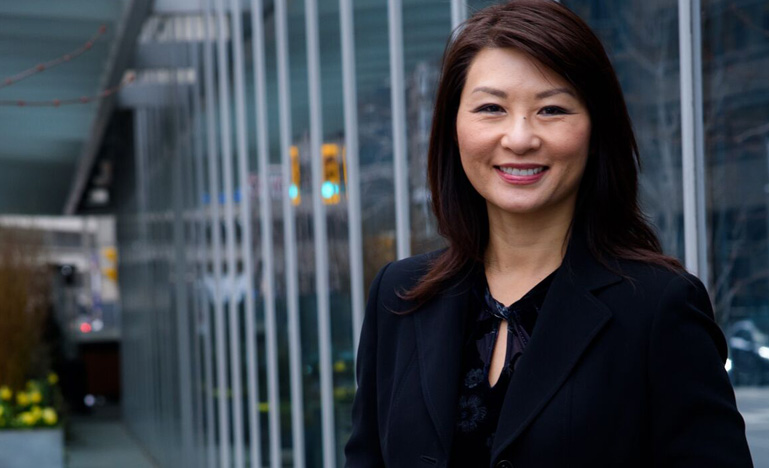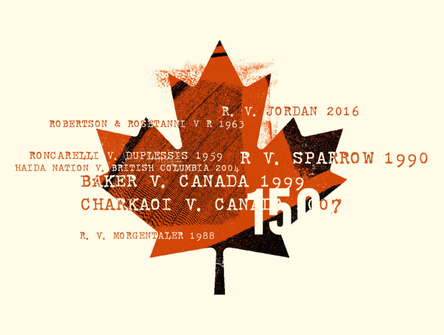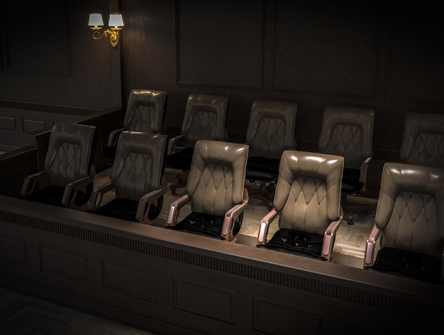Profile: Leola Pon
The art of learning and leading. And maintaining the right balance between work and health.

“I attended a session on how women GCs or women lawyers can get on boards. This was a couple years ago. There were about 20 speakers in total, and all of them were white,” recalls Leola Pon. “At one point, one of the panelists talked about how, in the United States, they have regulations to ensure a portion of the seats of board directors are devoted to people who are Hispanic, and the speaker said ethnic diversity [on boards] is not an issue in Canada. When she said that I was livid.”
Despite some progress on gender diversity in the legal profession and on corporate boards, Leola still sees a lot of barriers for racialized lawyers. “I think that's probably where still quite a bit of work needs to be done. [Ethnic diversity on boards] is a big issue in Canada.”
Leola is the General Counsel at the Toronto District School Board (TDSB). She moved into the position in April 2016 on an interim basis and became permanent in December 2017. She is very proud of the work the TDSB and her legal department has done on issues of equity and diversity, but sees much more work ahead of them.
Her personal experience has led her to get involved with committees and panels promoting women, racialized groups and persons with disabilities, as well as events put on by Diverse Champions for Diversity, Legal Leaders for Diversity and Inclusion, and the Federation of Asian Canadian Lawyers, to name a few.
At work, she says, “we live and breathe” diversity at all levels of the organization. The TDSB is the fourth largest school board in North America and one of the most diverse. With almost a quarter of a million students in 582 schools, plus more than 140,000 adult learners and 38,000 employees, “we talk about those issues as part of daily vocabulary.” And while there will always be more that they can do, Leola and her team have been recognized and awarded for their diversity and equity initiatives.
For example, a few years ago, the TDSB undertook a significant RFP process for external legal services in eight areas of law. “One of the unique things we did in that process was to devote points and make as a fundamental criterium demonstration of commitment to equity and diversity,” she explains. “So it wasn't just, ‘Here give us your commitment statement.’ It was, ‘Give us real examples of what you've done to promote equity and diversity,’ not just in the legal field but in general. It was pretty refreshing to see how some firms have progressed—and it was interesting to see how some other firms need a lot more work in that area.”
Rising to the challenge
When Leola began the GC position, she had no previous GC experience, and credits a number of people including the TDSB Director of Education, Dr. John Malloy, as well as her predecessors Colin Grant and Tony Brown, and several non-lawyer mentors for her success.
“There were a number of things I wanted to change,” she says about when she started. She began with restructuring the legal department and looking at ways to cut costs. Reducing litigation costs by increasing in-house capabilities, expanding the online legal resources to enable schools to help themselves and working on improving lawyer retention rates have helped. But, she admits, “it's a long process and especially difficult now, with tighter budgets.”
“What has changed over the last few years in the legal functions at the TDSB,” she explains, “is the reliance on lawyers to do quite a variety of things. I think that's a testament to how much value we bring to the organization, so I'm quite happy with that, but it does take quite a bit of time for us to deal with all types of issues as well.”
The legal department is relied upon for not just legal advice but also strategic advice, with Leola working closely with the executive and senior team—which means “tons of meetings.”
Through all these meetings and other TDSB training, she has seen firsthand how “the way lawyers learn is quite different than the way teaching professionals learn…. We can sit through an hour and a half [or more] of having someone tell us updates in law and so on, whereas teaching professionals are used to groupwork, interaction and lots of discussions.”
“Sometimes I feel impatient with that,” she adds with a laugh. “So that has been a bit of adjustment.”
Another area of adjustment for lawyers she has noticed is in communication styles. “I often help the communications department review certain matters that go out either to the community or on our website,” Leola explains. “How we write as lawyers, and what parents and laypeople expect in communications” is not always in line. “For some lawyers, that's a bit of a challenge.”
She credits some writing courses she took early on as “the best investment I ever made.” It helped her in law school as well as in the workplace “because when you become a GC, less and less of the work is purely legal. More and more of the work is the strategic stuff,” which may include helping write a news release, business proposal or crisis communications pieces.
Learning and leading
Crisis communications became reality for Leola in July 2017, when a student drowned on a TDSB-organized trip. “It was really sad. It was very difficult for everyone,” she says.
“We had no choice but to go into crisis management mode,” she continues. “And I think that particular incident really tested all of us on how to handle an extremely complex situation. There are several defining moments in my career, and that was one of them. It was really challenging, but we learned a lot and we are doing whatever we can to prevent things like that from ever happening again.”
Then, in April 2018, another tragedy struck: the Toronto Yonge Street van attack happened outside of the TDSB Head Office.
“I was at the office when the van attack happened. I wasn't on the street,” she recalls. “It was like a scene out of a movie. I just couldn’t believe it.” She looks at her colleagues in the aftermath, and “some of them are dealing with it well and some of them are not.”
For Leola, it triggered her existing post-traumatic stress. In July 2010, she was hit by a car from behind while crossing the street. “I was very healthy up to that point, athletic and all that,” she says. “That changed my life significantly. It caused a lot of health issues, both physical and mental.”
“So if I were to give advice to lawyers [who are known for working long hours],” she says, “I would say you're not going to be able to avoid an accident but what you can do is try to stay as healthy as possible. [Maintain] a balance between your work and investing in your own health.”
“You also need to have some humour,” she continues. “The issues we often deal with are very difficult, with high levels of scrutiny and accountability. You have to have humour to be able to work in this environment, as well as flexibility, open-mindedness and patience.”
It also helps to work with great people, who are moving the needle on important topics like diversity, access and equity—which Leola feels grateful for every day. “The people here are amazing, and I'm not the only one who says that,” she smiles. “You can't help but feel pretty good when you go to work.”
This article was initially featured in the Summer 2019 issue of CCCA Magazine.


